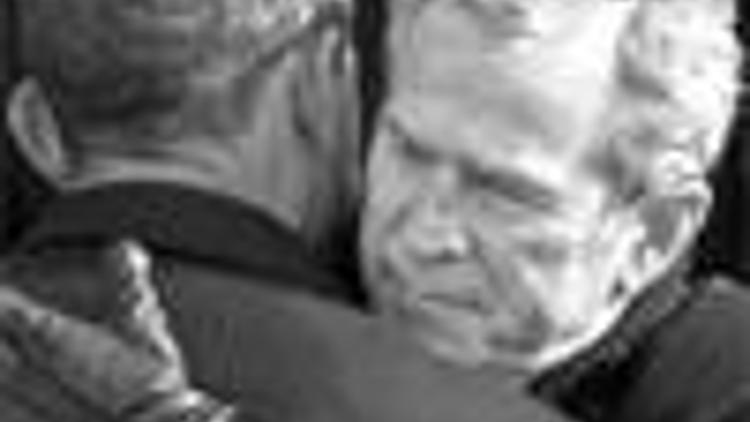Obama lifts veil on Bush secret memo
Güncelleme Tarihi:

AP
Oluşturulma Tarihi: Mart 04, 2009 00:00
WASHINGTON - The Obama administration threw open the curtain on years of Bush-era secrets, revealing anti-terror memos that claimed exceptional search-and-seizure powers and divulging that the CIA destroyed almost 100 videotapes of interrogations and other treatment of terror suspects.
The Justice Department released nine legal opinions late on Monday showing that, in the wake of the Sept. 11 terror attacks on the United States, former President George W. Bush's administration determined that certain constitutional rights would not apply during the coming fight. Within two weeks, government lawyers were discussing ways to wiretap U.S. conversations without warrants.
The Bush administration eventually abandoned many of the legal conclusions, but the documents themselves had been closely held. By releasing them, President Barack Obama continued a housecleaning of the previous administration's most contentious policies. "Too often over the past decade, the fight against terrorism has been viewed as a zero-sum battle with our civil liberties," Attorney General Eric Holder said in a speech a few hours before the documents were released.
The Obama administration also acknowledged in court documents Monday that the CIA destroyed 92 videos involving terror suspects, including interrogations, far more than had been known.
Congressional Democrats and other critics have charged that some of the harsh interrogation techniques amounted to torture, a contention Bush and other of his officials rejected.
The new administration pledged on Monday to begin turning over documents related to the videos to a federal judge and to make as much information public as possible.
The legal memos written by the Bush administration's Office of Legal Counsel show a government grappling with how to wage war on terror in a fast-changing world. The conclusion, reiterated in page after page of documents, was that the president had broad authority to set aside constitutional rights. Fourth Amendment protections against unwarranted search and seizure, for instance, did not apply in the United States as long as the president was combating terror, the Justice Department said in an Oct. 23, 2001, memo.
"First Amendment speech and press rights may also be subordinated to the overriding need to wage war successfully," Deputy Assistant Attorney General John Yoo wrote, adding later: "The current campaign against terrorism may require even broader exercises of federal power domestically." On Sept. 25, 2001, Yoo discussed possible changes to the laws governing wiretaps for intelligence gathering. In that memo, he said the government's interest in keeping the nation safe following the attacks might justify warrantless searches. That memo did not specifically attempt to justify the government's wiretapping program, but it provided part of the foundation.
The memos reflected a belief within the Bush administration that the president had broad powers that could not be checked by Congress or the courts. That stance, in one form or another, became the foundation for many policies: holding detainees at Guantanamo Bay, Cuba; eavesdropping on U.S. citizens without warrants; using tough CIA interrogation tactics; and locking U.S. citizens in military brigs without charges.
The Bush administration eventually abandoned many of the legal conclusions, but the documents themselves had been closely held. By releasing them, President Barack Obama continued a housecleaning of the previous administration's most contentious policies. "Too often over the past decade, the fight against terrorism has been viewed as a zero-sum battle with our civil liberties," Attorney General Eric Holder said in a speech a few hours before the documents were released.
The Obama administration also acknowledged in court documents Monday that the CIA destroyed 92 videos involving terror suspects, including interrogations, far more than had been known.
Congressional Democrats and other critics have charged that some of the harsh interrogation techniques amounted to torture, a contention Bush and other of his officials rejected.
The new administration pledged on Monday to begin turning over documents related to the videos to a federal judge and to make as much information public as possible.
The legal memos written by the Bush administration's Office of Legal Counsel show a government grappling with how to wage war on terror in a fast-changing world. The conclusion, reiterated in page after page of documents, was that the president had broad authority to set aside constitutional rights. Fourth Amendment protections against unwarranted search and seizure, for instance, did not apply in the United States as long as the president was combating terror, the Justice Department said in an Oct. 23, 2001, memo.
"First Amendment speech and press rights may also be subordinated to the overriding need to wage war successfully," Deputy Assistant Attorney General John Yoo wrote, adding later: "The current campaign against terrorism may require even broader exercises of federal power domestically." On Sept. 25, 2001, Yoo discussed possible changes to the laws governing wiretaps for intelligence gathering. In that memo, he said the government's interest in keeping the nation safe following the attacks might justify warrantless searches. That memo did not specifically attempt to justify the government's wiretapping program, but it provided part of the foundation.
The memos reflected a belief within the Bush administration that the president had broad powers that could not be checked by Congress or the courts. That stance, in one form or another, became the foundation for many policies: holding detainees at Guantanamo Bay, Cuba; eavesdropping on U.S. citizens without warrants; using tough CIA interrogation tactics; and locking U.S. citizens in military brigs without charges.

